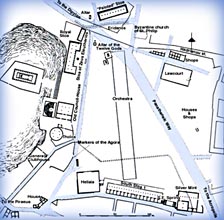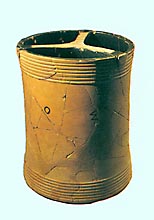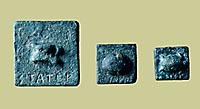There were six agoranomoi (market officials) in
the fifth century, ten in the first half of the fourth
century. Their duties were posted in front of the Agoranomion
(Market Officials' House) in the Athenian marketplace.
These included supervising: the market area;
the conduct of persons circulating in it; and the goods
on sale. The agoranomoi also enjoyed certain
powers of a judicial nature, such as for instance being
able to impose a fine. Lastly, they were responsible for
collecting certain taxes, such as:
The 'agoranomic' tax, a tax paid by
Athenian traders in order to book a pitch in the
Agora (or its arcades) as a sales area.
The 'xenic' tax, paid by foreigners for the
use of the marketplace.
The prostitute tax
and
the consumption tax,
imposed on products bought in the market. |
 |










